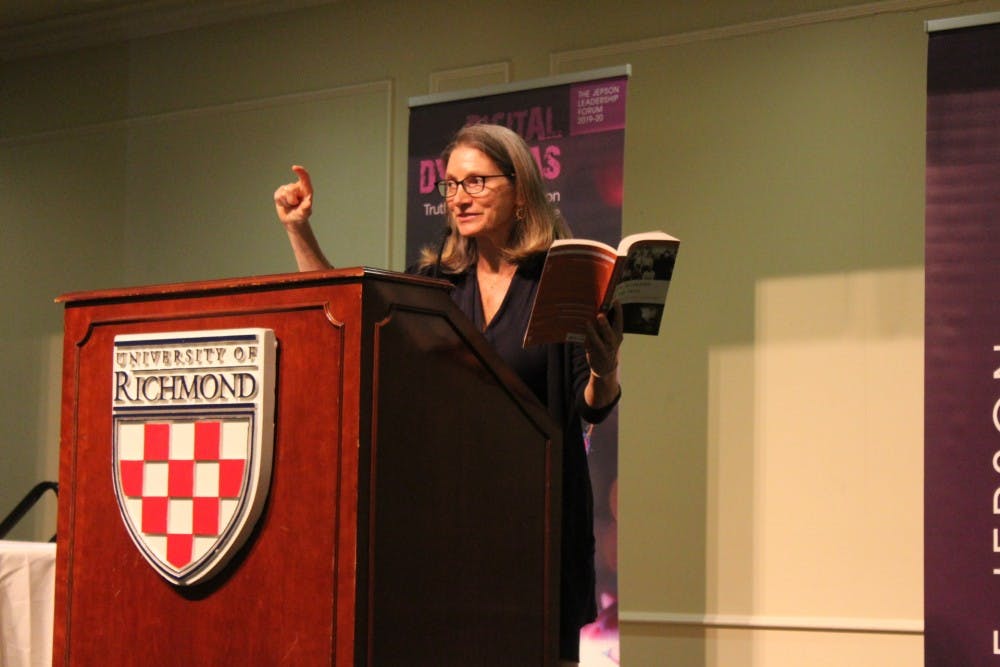New York Times contributor Katie Hafner focuses on the people when she writes her stories.
“These people are really interesting people. I thought if we could make it more about the people than the technical stuff, then maybe we’ve got something,” Hafner said she had told her agent when she first called him with the idea to write a book about the origins of the Internet.
Hafner co-authored that book, "Where Wizards Stay Up Late: The Origins of the Internet," with her late first husband, Matthew Lyon.
“Everything somehow comes back to the people,” she said.
Hafner writes obituaries and advance obituaries, interviewing prominent technological innovators before their deaths. Her advice for writing profiles is to capture someone’s personality and create a vivid image, which she sometimes does by asking the people near her subject for a colorful story they remember, she said.
Hafner also once asked a Furby hacker -- yes, the talking bird-like toys popular in the early 2000s -- to bring his Furbys to their interview.
Hafner was the first speaker in the 2019-2020 Jepson Leadership Forum series, Digital Dystopias: Truth and Representation in the Internet Age.
Addressing a crowd Tuesday night largely composed of Richmond residents and few students, Hafner covered the beginnings of the Internet, providing information from her book. Delivering her information with frequent ribs, such as referring to MIT as "where all nerds are born," Hafner kept the audience engaged.
The various founders of the Internet fight for sole credit, Hafner said. Even today when she interviews them, they often refer to this fight as something they remain unhappy about.
The founding of the Internet was a process, Hafner said, reading the quote from Paul Baran, one of the inventors, that she ended his obituary with.
The process of technological developments is like building a cathedral -- each new person lays a block on the foundations and says that he built a cathedral, Baran told her in 1990.
“If you are not careful you can con yourself into believing that you did the most important part. But the reality is that each contribution has to follow onto previous work. Everything is tied to everything else.”
Enjoy what you're reading?
Signup for our newsletter
First-year Penny Hu attended Hafner's talk because of her interest in computer science, she said.
“It was very fascinating when she talked about actually, the founding fathers actually fight about who founded the Internet,” Hu said.
Her generation knows so little about the origins of the Internet, Hu said, so she found the talk educational.
Hafner outlined the contributions of individual men to the Internet, such as Bob Taylor, a psychologist who wanted to connect the three computer terminals in his office and supposedly convinced his boss to give him $1 million to try.
Others include the previously mentioned Baran, who outlined three types of networks — centralized, decentralized and distributed; J.C.R. Licklider, the first director of the Department of Defense Advanced Research Projects Agency’s Information Processing Techniques Office; Leonard Kleinrock, who developed the mathematical theory for packet switching, or sending information in separate pieces to be reassembled at its destination; and Donald Davies, who introduced the idea of packet switching.
Senior Ben Weinstein attended because the thesis he is writing is related to the intersection of Internet and society. He said he wished that more students came to these talks, and that he felt disconnected because this talk in particular seemed oriented to Boomers.
“I thought that it would be a good background for my research,” Weinstein said, “However, it didn’t really go that much into the society impact as much as attributing the kind of technological innovations that were necessary to create the Internet we know today.”
As a journalist, Hafner covers technology and healthcare, as she did for her decade on staff at The New York Times and at Newsweek before that. Hafner wrote about topics such as love over email and Bluetooth for Circuits, the Times’ former technology and society section. Hafner has six published books, ranging in topic from the pianist Glenn Gould to a memoir about living with her mother and teen daughter in one house.
The journalism industry is shifting, not dying, Hafner said. Online publication means that content can be interactive, she said, and paying for such content will likely become the norm.
Her advice for aspiring journalists?
“Always question your assumptions,” Hafner said, whether it be about someone’s gender over the phone or the spelling of a name.
Second, know there is no such thing as objective journalism — everything is a choice, from whom journalists use as sources to which quotes they include and how they structure stories. Journalists should bend over backwards to avoid making snap decisions and remain aware of their choices, she said.
Hafner said she realized the subjectivity of journalism as a 7-year-old, when her teacher showed the class The San Diego Union newspaper — now The San Diego Union-Tribune — and pointed out the photo that the paper used of Democrat Lyndon B. Johnson — one in which he looked terrible, she said. The area near San Diego in which she lived was largely Republican, Hafner said.
Contact news and content editor Katherine Schulte at katherine.schulte@richmond.edu.
Support independent student media
You can make a tax-deductible donation by clicking the button below, which takes you to our secure PayPal account. The page is set up to receive contributions in whatever amount you designate. We look forward to using the money we raise to further our mission of providing honest and accurate information to students, faculty, staff, alumni and others in the general public.
Donate Now



